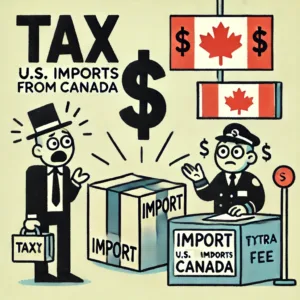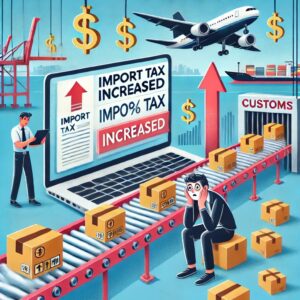Introduction
On February 3, 2025, President Donald Trump announced significant changes to U.S. trade policy, introducing new tariffs and closing a longstanding loophole that has major implications for e-commerce tariffs on US imports. These measures are poised to reshape the landscape for online retailers and consumers alike.

E-Commerce Tariffs on US Imports: Updates with Mexico
In addition to the termination of the “de minimis” exemption, the U.S. government has imposed a 25% tariff on imports from Mexico, effective February 4, 2025. However, following negotiations between President Trump and Mexican President Claudia Sheinbaum, the implementation of these tariffs has been delayed by one month. In exchange, Mexico has agreed to deploy 10,000 National Guard troops to strengthen border security and curb illegal activities. This delay provides a window for businesses and consumers to prepare for the impending changes in e-commerce tariffs on US imports from Mexico.

E-Commerce Tariffs on US Imports: Updates with China
In contrast to the temporary reprieves granted to Mexico and Canada, the United States has implemented a 10% tariff on imports from China, effective February 4, 2025. This move aims to address trade imbalances and concerns over illicit drug trafficking, particularly fentanyl. The new tariffs are expected to significantly impact Chinese e-commerce platforms like Shein and Temu, which have benefited from the “de minimis” exemption allowing duty-free entry for shipments under $800. With the exemption’s removal, these companies may face increased costs, potentially leading to higher prices for consumers and shifts in the competitive landscape of e-commerce tariffs on US imports.

E-Commerce Tariffs on US Imports: Updates with Canada
Similarly, the United States has announced a 25% tariff on imports from Canada, with a 10% tariff specifically on Canadian energy resources. After discussions between President Trump and Canadian Prime Minister Justin Trudeau, these tariffs have also been postponed for one month. Canada has agreed to appoint a “fentanyl czar” and enhance efforts to combat drug trafficking. This postponement allows Canadian exporters and U.S. importers additional time to adjust to the forthcoming e-commerce tariffs on US imports from Canada.

Conclusion
In conclusion, the recent changes to e-commerce tariffs on US imports represent a pivotal shift in trade policy with far-reaching consequences. While intended to bolster domestic businesses and address concerns over trade practices, these measures are likely to lead to higher prices and longer delivery times for consumers, as well as strategic adjustments by both domestic and international retailers. As the situation evolves, businesses and consumers alike will need to navigate this new landscape carefully.

